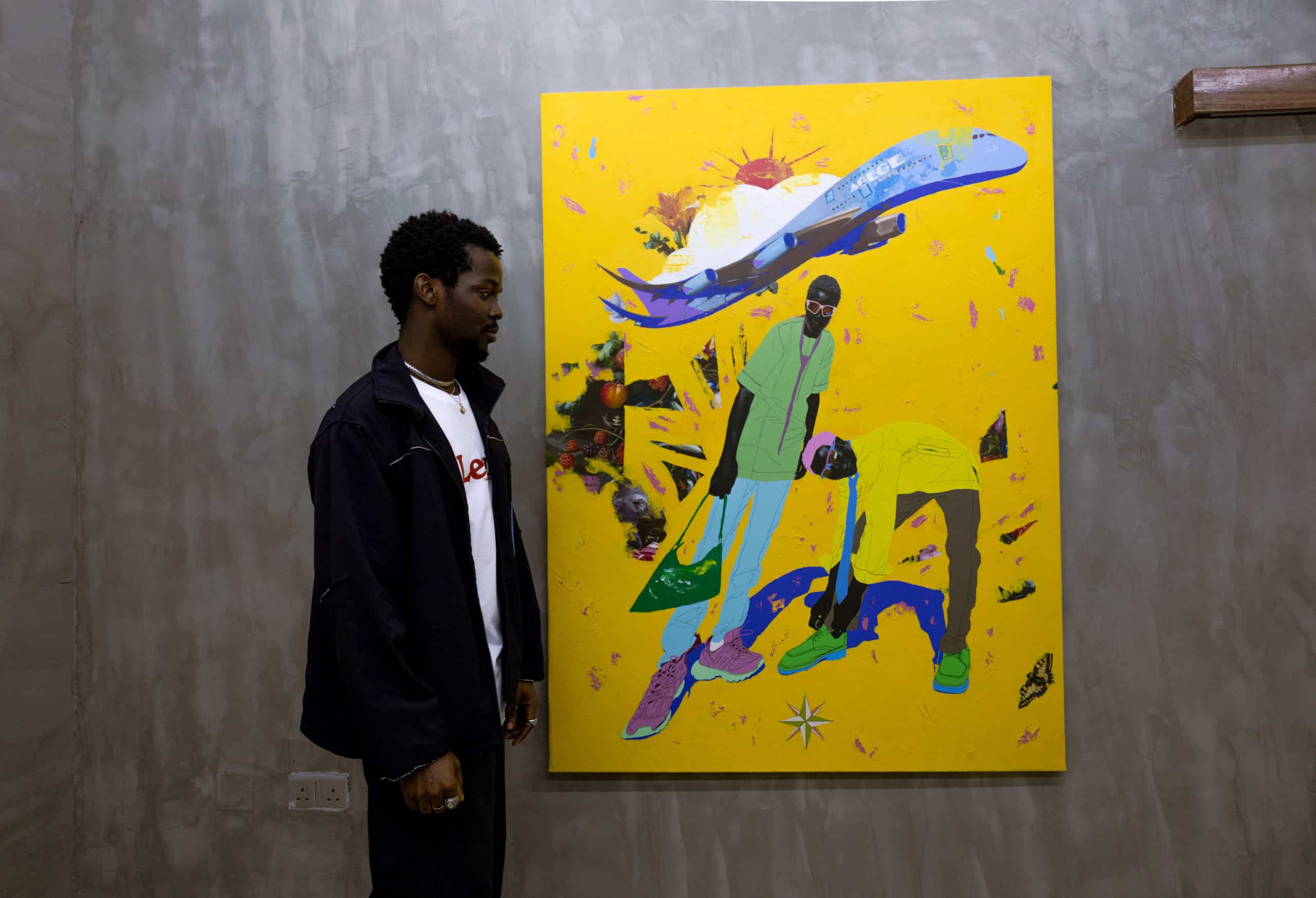In the realm where technology meets creativity, a revolution is unraveling in Nigeria’s blooming art scene. The surge in cryptocurrency and emergence of Non-Fungible Tokens (NFTs) are seeing artists scale new heights online.
Digital artists are in great demand today, faced with an expansive canvas, and more opportunities for growth, especially with the emergence of cryptocurrencies and Non-Fungible Tokens (NFTs). From 2019 to 2023, a Statista study reports that nearly one in three respondents from Nigeria expressed that they own or use digital coins, in contrast to a mere six out of a hundred in the United States. In Nigeria’s booming digital art landscape, we shed light on those creating visuals fusing technology with tradition. Pixels and imagination converge making way for new dimensions of artistic exploration and expression.
Celebrating The Lived Experiences Of Black Women Through Digital Art
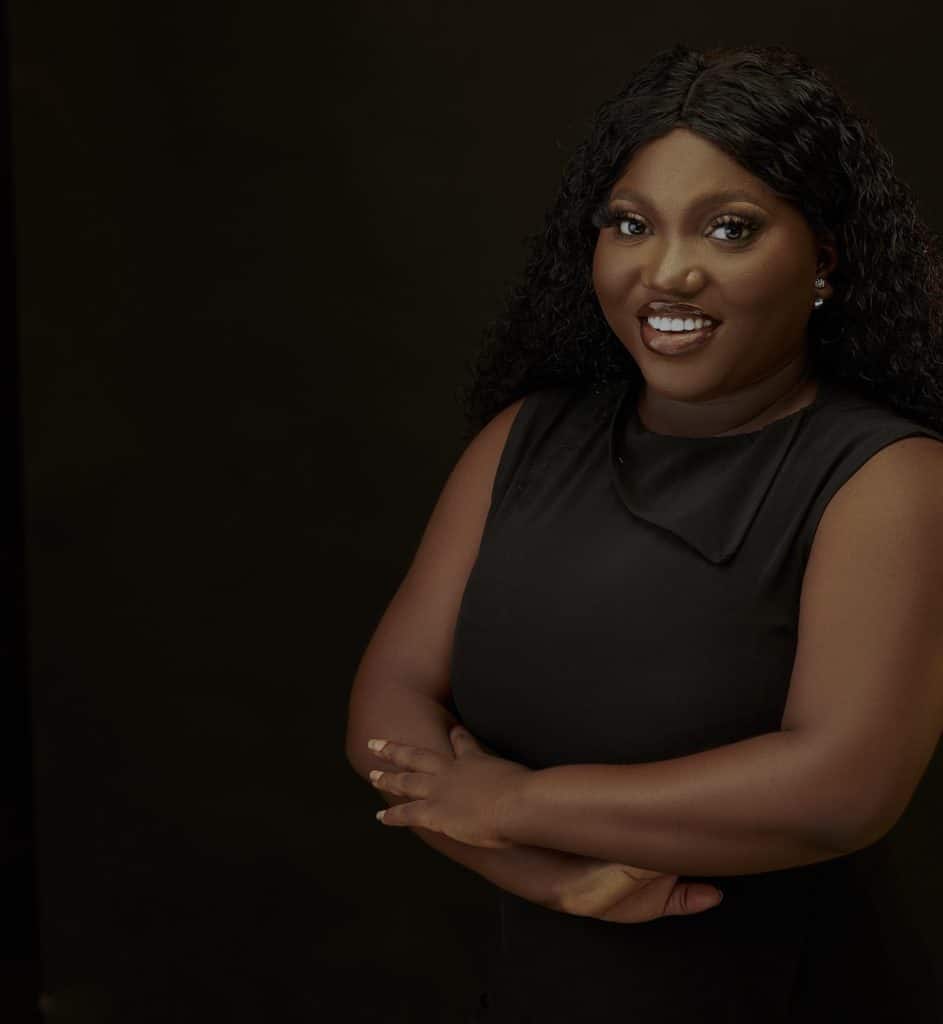
Oghenerume Ohimor, widely known as Yinkore, is a digital artist whose creative focus centers on capturing the lived experiences of black women. Over the last six years, Yinkore embarked on her digital art career during a challenging period, turning to tech platforms to distract her from a medical issue. Her journey began with apps on her iPod Touch and evolved into a full-fledged digital art practice.
Reflecting on that period, Yinkore shares with FORBES AFRICA: “I was in a lot of pain and needed the distraction that art usually gave me, but without all the physical input, because at the time I was not physically capable of creating any traditional paintings.”
In Nigeria’s evolving digital art landscape, Yinkore observes a surge in popularity due to factors such as social media exposure and the emergence of NFTs, enabling artists to sustain themselves through their work. Initially centered around graphics and design, the field has broadened to encompass diverse styles and mediums. She points out the increased opportunities for digital artists to exhibit their work.
Yinkore seamlessly integrates technology into her creative process, utilizing photos as references and embracing tools like 3D-modeling and printing. Amid the ever-changing tech scene, she places importance on consistency and adaptability.
“I personally like using photos for references or very recently, as part of my pattern work. My iPad and I are, of course, inseparable, and I print all my exclusive pieces on huge canvases.”
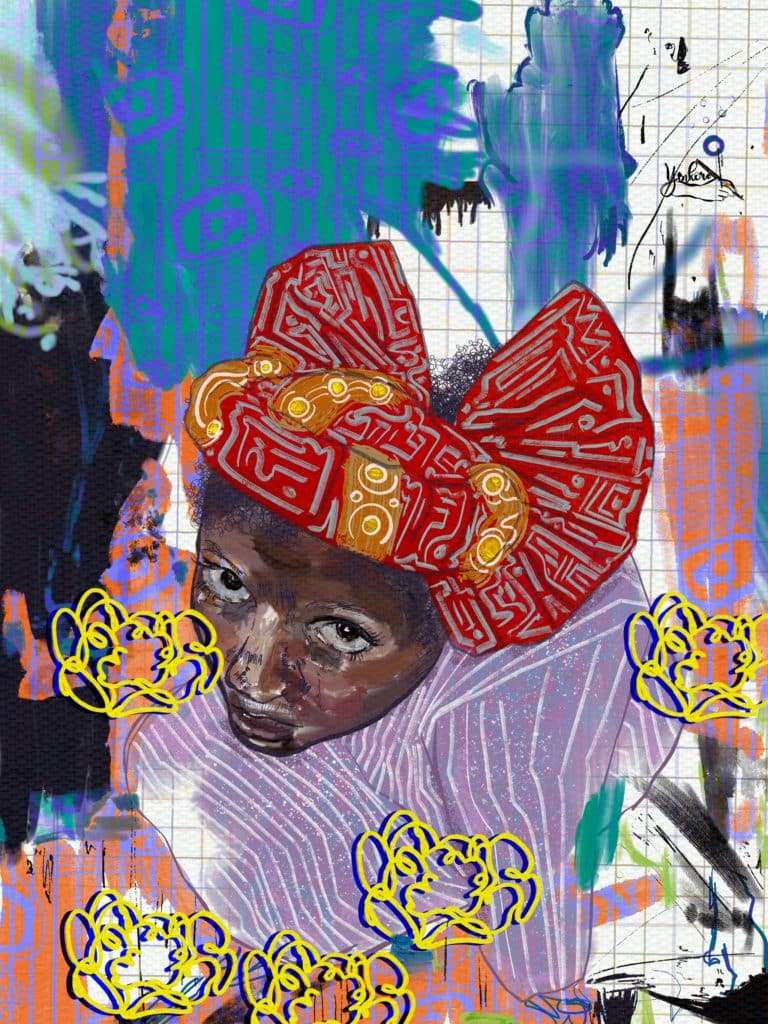
Her Nigerian heritage lies at the heart of her artistic expression, with her work celebrating the country’s cultural elements, particularly patterns and clothing.
“My art is definitely a celebration of a lot of my heritage, to be honest, the women.”
Social media has played a pivotal role in promoting her work and catalyzing her career, with online communities providing support and encouragement.
Discussing specific projects where she collaborated with technology companies or startups to create innovative art installations or experiences, she recounts: ‘My Wildxyz artist residence involved creating 100 digital art pieces, and displaying them required crafting a 4D-environment composed of various greenery, water, and even sounds that contributed to the complete experience.”
In Nigeria, digital tools have democratized art creation, giving rise to a new generation of artists who garner recognition and opportunities on a global scale. However, Yinkore acknowledges that challenges tied to copyright and ethics may arise as digital art gains prominence, especially in a country where the copyright protection of traditional art is already a concern. Looking ahead, Yinkore envisions a promising future for digital art in Nigeria, foreseeing more exhibitions, increased adoption of augmented reality (AR) and virtual reality (VR) technologies, and immersive physical events. She expresses hope that as this growth unfolds, ethical considerations surrounding copyright will be addressed to safeguard artists’ rights. While Yinkore has yet to benefit from governmental or collective initiatives, her journey and insights contribute significantly to the evolving digital art scene in Nigeria.
Digital Narratives Of Identity And Culture

Freddie Jacob, a digital artist, designer, and illustrator, passionately crafts her art around narratives rooted in identity, culture, self-image, mental health, and societal experiences. Her canvases spring to life with stories that resonate across diverse audiences, as she intertwines personal experiences with broader social themes.
Jacob’s artistic journey has unfolded over a lifetime. Her childhood fascination with sketching gradually matured into a full-fledged digital art career in 2020. Fondly reminiscing about sketching on the back of notes during her youth, she cherishes the sheer joy of using a pencil to create something, a passion that guided her into the realm of digital artistry. Jacob tells us: “I love painting beautiful, strong and confident characters… picking up a pencil gave me so much joy.”
Reflecting on the metamorphosis of digital art in Nigeria over the past decade, Jacob characterizes it as a “bloom”. She finds joy in witnessing the burgeoning presence and online community of digital creatives, even as she acknowledges that Nigerian society has yet to fully embrace the realm of digital art and its intricacies.
“I’m thrilled by this evolutionary process and genuinely grateful for the burgeoning family of digital artists in our nation,” she affirms.
As technology becomes an integral part of her creative process, Jacob explains: “I harness digital technology to create my art pieces. Utilizing digital painting software like Procreate and devices such as the Apple iPad + Pencil, the internet aids me in developing art concepts, referencing, and collaborating with fellow artists.”
While her journey into technology has encountered minimal hurdles, Jacob acknowledges a recurring obstacle: the issue of reliable electricity in Nigeria. She underscores that digital creation hinges on consistent power supply, a challenge exacerbated by the country’s electricity limitations.
Jacob’s art reverberates with the echoes of Nigeria’s cultural heritage. Honoring her Urhobo roots from Delta State, she pays homage through pieces named in her tribal language, drawing inspiration from her heritage’s cultural opulence. “A myriad of cultural influences and appreciations infuse my creations,” she states.
Her collaborations with technology companies and startups stand as a testament to her innovative spirit. From commissioned pieces to mural team projects, multi-artist collaborations, corporate illustrations and art exhibitions, Jacob’s embrace of the
confluence of art and technology manifests in both virtual and physical domains. Sustaining an equilibrium between technology and tradition, Jacob treasures her foundation in traditional art. Often commencing her creative process on physical paper before translating it into the digital realm, she melds the essence of traditional techniques into her digital works. This synergy empowers her to apply established artistic principles to her digital creations. As she shares, “The same rules of values, fundamentals, colors, etc., still exist when painting digitally. These enduring principles guide my art creation processes, and I draw on the knowledge of traditional art.”
Social media and online communities have propelled Jacob’s art to new heights. Through these platforms, she has garnered support, expanded her reach, and forged connections with artists across the globe. The worldwide art community’s unifying power has showcased her creations to diverse audiences, allowing her to leave an indelible mark on an international scale. The accessibility of digital tools and software has leveled art creation in Nigeria, ushering in newfound possibilities for budding artists.
For Jacob, this expansion opens doors for a new generation of creatives to explore their talents. Peering into the future, she anticipates growing appreciation for digital art as a legitimate medium, inspiring individuals to embrace it as a career path and fostering a deeper celebration of its unique contributions to the nation’s creative tapestry.
Creating Digital Art With Nigerian Essence
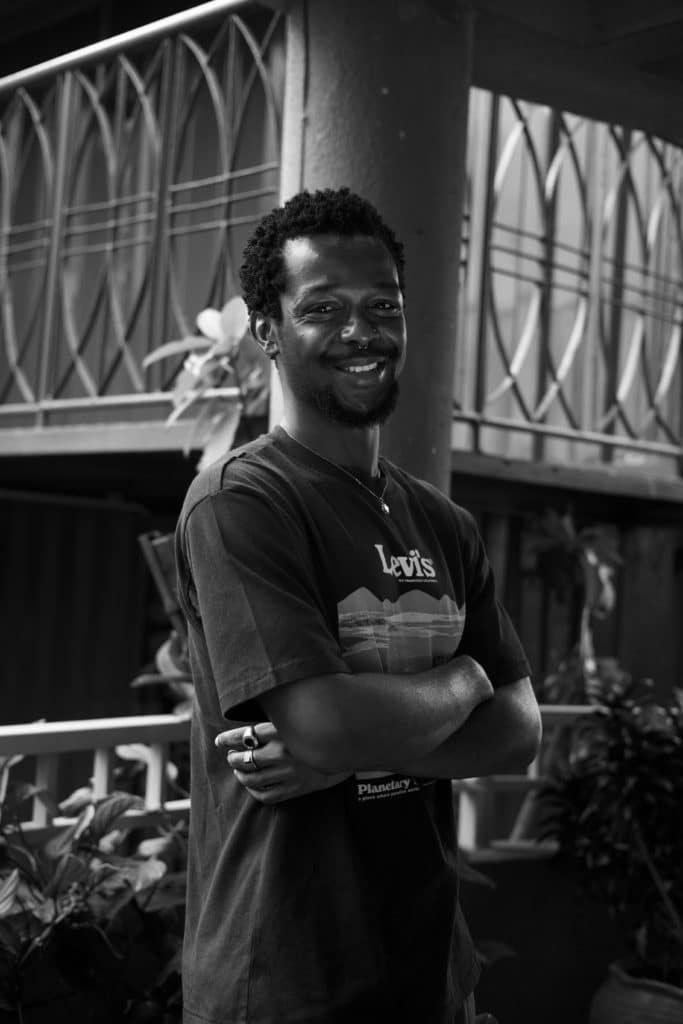
Adesola Yusuf, a digital artist from Lagos, embarked on his artistic journey a decade ago, tracing his initial digital strokes on his phone. Reflecting on his evolution, Yusuf tells FORBES AFRICA: “Two years later, I got serious and learned how to use Photoshop, around the same time I discovered collages on
Pinterest that heavily influenced my direction in digital art, and I haven’t looked back.”
When contemplating the transformation of digital art in Nigeria over the past decade, Yusuf expresses his admiration for its evolution and growing acceptance. Acknowledging the progress achieved, he remains aware of the untapped potential that lies ahead.
Revealing his perspective, he shares: “One trend I love is the creation and focus on the Nigeria aesthetic, for example, the emergence of the danfo-inspired font (danfo is a popular term for one of the commercial buses in the Lagos metropolis).”
Incorporating technology is a cornerstone of Yusuf’s creative process. Whether working digitally or traditionally, he merges technological tools into his artistry.
He elaborates: “I rely heavily on my phone’s camera to take a bunch of references and Photoshop to conceive my idea before bringing it to fruition. I’ve explored 3D software and augmented reality in the past and would love to revisit these mediums.”
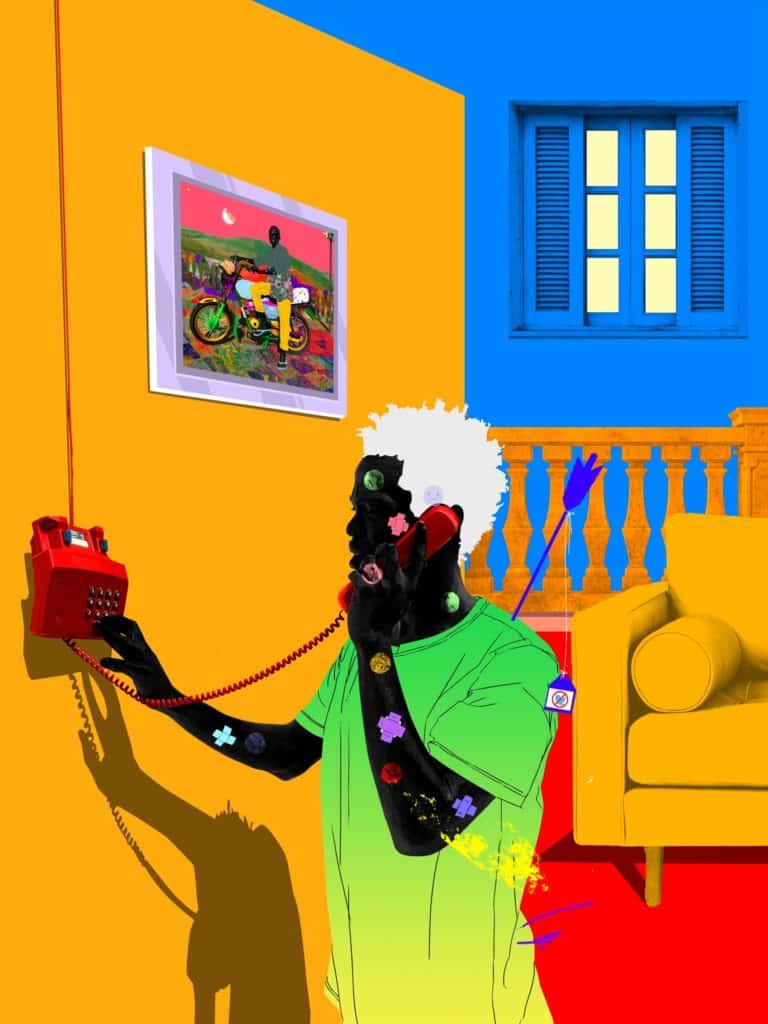
Yusuf’s work seamlessly intertwines with Nigerian cultural and artistic heritage. As a resident of Nigeria, the cultural tapestry naturally weaves itself into his creations, both intentionally and subconsciously. Recognizing the inherent significance of cultural infusion, he places special emphasis on its relevance within the contemporary context.
While Yusuf thrives within the realm of digital art, he maintains an unbreakable connection to traditional techniques. His canvases include both digital masterpieces and traditional paintings, reflecting his versatility. Social media platforms and online communities are pivotal in Yusuf’s journey, serving as platforms to showcase his work on a global scale. These digital spaces have not only extended his reach but also generated unique opportunities, all facilitated from the comfort of his own space. The democratization of digital tools and software has revolutionized art creation in Nigeria.
Yusuf observes: “As technology becomes more accessible, people are empowered to express themselves digitally. The internet provides a stage to exhibit and even monetize these creative endeavors, fueling the growth of the artistic landscape in Nigeria.” While he has yet to participate in governmental initiatives or artistic collectives fostering the digital art and technology intersection in Nigeria, Yusuf’s journey remains inherently influential. Looking ahead, he envisions a landscape where technology ushers in a new wave of digital artists
Bridging Artistry And Technology
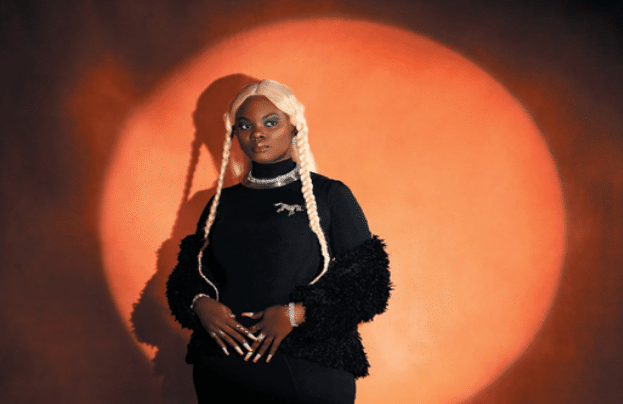
Omobolarinwa Oladimeji, a self-trained multidisciplinary artist based in Lagos, Nigeria, embarked on a journey of boundless creative exploration, diverging from her degree in Urban & Regional Planning from the University of Lagos (UNILAG) to immerse herself in the world of art.
Oladimeji shares with FORBES AFRICA: “I have been doing art since 2019. I started as a traditional artist before venturing into digital art in 2022. I delved into the digital art space to explore artistic mediums and broaden my skill set. I’ve been a digital artist for a year and a half now.”
Reflecting on the transformation of digital art over the past decade, Oladimeji provides insightful observations: “In Nigeria, digital artists weren’t perceived as bona fide artists for a long time. However, with the improvement of digital infrastructure and the burgeoning digital economy, there’s now a greater appreciation for all things digital. Yet, biases persist within the Nigerian artscape. Nonetheless, some galleries have begun embracing digital art and representing digital artists. I would love to witness more galleries and collectors embrace digital art. Our work is surfacing in new ways; a trend emerges as music artists increasingly opt for digital art.”
Technology remains a companion in Oladimeji’s artistic odyssey. She hones her skills through online courses on platforms like Udemy and Skillshare, refining her abilities both in traditional and digital spheres. Utilizing symmetry tools and drawing apps streamlines her creative process, enabling her drawings to flourish. Notably, Oladimeji acknowledges the efficacy of digital platforms, facilitating global exhibitions while circumventing the logistical challenges inherent in physical art.
Tackling technology-induced challenges, Oladimeji recounts an obstacle she faced as a digital artist due to policies from the Central Bank of Nigeria (CBN) affecting online transactions.
Through innovation and the support of Nigerian tech startups, she triumphed over these hurdles.
“Thankfully, I managed to find a way around that by using virtual cards for my payments. I am grateful for Nigerian tech startups; technology to the rescue again.”
Imbued with her Nigerian heritage, Oladimeji’s art vibrates with “Afro-centric themes”.
She shares, “I love creating Afro-centric-themed art pieces. I paint African mask heads and celebrate African/Nigerian women, their beauty, resilience, style, and stories. My mandala drawings incorporate a wealth of cultural motifs and symbols.” Oladimeji’s collaborations with technology companies spotlight her innovative spirit. A notable mural project for uLesson, an edtech platform, underscores her adaptability and creative prowess, highlighting the crossroads of art and technology where Oladimeji thrives.
Her balancing of traditional and digital techniques exemplifies her multidisciplinary approach. Navigating both realms, Oladimeji integrates each medium to enrich the other, harnessing this artistic duality to fuel her creativity and explore unique perspectives in her work.
Social media platforms and online communities serve as transformational forces in Oladimeji’s artistic journey, amplifying her reach and enabling her to connect with a global audience. Her foray into the crypto art space has opened doors to opportunities, even internationally.
“Starting in 2019, I shared my art online as a hobby. Encouragement pushed me to take art more seriously. Joining the crypto art space in 2021, selling my art as NFTs, opened countless local and global opportunities. My work has been featured in multiple exhibitions around the world.”
The accessibility of digital tools and software has democratized art creation in Nigeria, empowering artists to overcome financial constraints. As the global art scene embraces inclusivity, independent Nigerian artists emerge, liberated from traditional pathways and finding recognition and success through digital mediums.
While Oladimeji’s journey hasn’t intersected directly with governmental initiatives or artistic collectives, she recognizes the transformative potential of such endeavors on her artistic practice.
Looking to the future, Oladimeji’s aspirations involve witnessing galleries embrace digital pieces utilizing digital
screens to display artworks in rotation. Challenges remain, particularly in dispelling misconceptions about digital art’s complexity.
Oladimeji urges the art community to let go of biases, recognizing that while efficiency may define digital art, it certainly doesn’t diminish its depth and significance in the artistic realm.
A Visionary Of Digital Expression
Chukwuka Azuaru, widely known as Chxka, has been a trailblazer in the realm of digital art for six years, pushing the boundaries of creative expression in the digital landscape.
Reflecting on the metamorphosis of digital art in Nigeria over the past decade, Azuaru highlights the remarkable advancements and exposure that have transformed the landscape. He notes the rapid migration from traditional to digital art, illustrating artists’ adaptability to new mediums. Additionally, Azuaru observes a burgeoning interest in exploring the realm of Non-Fungible Tokens (NFTs), signaling a movement towards innovative digital platforms.
Azuaru tells FORBES AFRICA: “I’ve seen people move from traditional to digital art so fast. Also, the need to explore NFTs.” For Azuaru intergrating
technology into his creative process has been a double-edged sword. He acknowledges his
limitations in this aspect, citing time-constraints and the lack of proper facilities. Yet, despite these challenges, he continues to harness the potential of technology in his artistry.
Challenges often arise when incorporating technology, and Azuaru is no exception. He cites the need for better technological resources as a limiting factor in realizing his creative vision.
Drawing profound inspiration from Nigeria’s cultural heritage, Azuaru emphasizes that culture underpins his creative endeavors. “I’ve
been a user of dark skin tones and Nigerian aesthetics for a while. Only recently did that diminish.”
While his journey has yet to intersect with technology companies or startups in collaborative projects, Azuaru remains open to future opportunities that may emerge in this dynamic realm.
Azuaru finds solace in painting, a practice that grounds him in the realm of traditional artistic techniques while allowing him to infuse them with modern digital expressions.
Social media platforms and online communities play a pivotal role in propelling his work into the limelight. He acknowledges their instrumental influence, recognizing that without these platforms, his art might have remained hidden from the world at large. “Without social media, my art would be in a basement or storage somewhere unseen by people who are not family.”
Peering into the future, Azuaru envisions a landscape where AI art takes center stage, offering both opportunities and challenges.
He anticipates AI- driven creativity enabling individuals, regardless of artistic background, to visually articulate their ideas. Azuaru is confident the world of digital art will continually evolve. “Digital art will keep advancing as long as people dream,” he adds.
